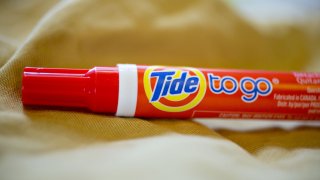
- Tide to Go is going to outer space. Tide detergent is partnering with NASA to keep astronauts' spacesuits clean, even if they travel to Mars.
- The Procter & Gamble brand is hoping for technological breakthroughs that will help it create fabric care products for regions that face water scarcity, which is a growing threat due to climate change.
- A quarter of the world's population face "extremely high" water stress, according to the World Resources Institute.
Tide to Go is going to outer space. The Procter & Gamble brand is partnering with NASA to keep astronauts' spacesuits fresh, even on Mars.
Company and NASA scientists have created a fully degradable detergent that will clean clothes without wasting water. Over the next decade, they'll be testing fabric care products, including Tide to Go pens and wipes, at the International Space Station and on missions to the moon and Mars.
Beyond making a difference for the handful of astronauts who travel to space, the partnership could have larger implications for Earthbound consumers. Climate change has already begun stressing the global water supply, from causing droughts in some regions to floods in others. A quarter of the world's population face "extremely high" water stress, according to the World Resources Institute.
Get Tri-state area news and weather forecasts to your inbox. Sign up for NBC New York newsletters.
"Scientific breakthroughs always starts from a very limited application, but when we get that breakthrough, the ability to use it to solve today's problems on Earth is going to be phenomenal," said Shailesh Jejurikar, chief executive officer of P&G's fabric and home care division.
Space research and development have led to many discoveries that have impacted people on Earth, like new water purifiers, the technology that led to CAT and MRI machines and drugs to combat muscle atrophy and bone loss more effectively.
Jejurikar said NASA reached out to P&G as it tried to solve the cleaning challenges that astronauts face in space. According to NASA filings, the consumer packaged goods giant has had a Space Act Agreement with the agency since August. The partnership has an estimated dollar value of more than $111,000 and is nonreimbursable, so each party bears the cost of its own participation.
Money Report
The months or even years that astronauts spend away from Earth means that their spacesuits and clothes can become smelly and stained. Clothes have to be reworn several times before they are ejected with other waste into the atmosphere or sent back to Earth as trash. A crew member will receive 160 pounds of clothes per year through resupply shipments.
"It's actually an extremely tough cleaning challenge. Astronauts, to stay fit, need to work out a couple of hours every day to manage their health," Jejurikar said. "And if you're working out two to three hours every day, it's going to be sweaty."
But their location presents unique challenges for laundry, like the changes in gravity and the need to reuse every drop of water. Jejurikar said that while Tide's innovation process is the same as usual, the restrictions shape the focus of the team's efforts.
For Earthbound Tide scientists, existing data and machine learning technology have helped understand what likely will or will not work in space. Some conditions can also be mimicked, like the need for the water to be reused for drinking and the weakened gravitational force.
Next year, the partnership's prototypes will get a first test at the International Space Station to see if the products hold up in microgravity conditions and when exposed to space's radiation levels.
"While this is interesting work that we are doing, it is one of the many projects at work that we are doing to see how we can significantly get the technology breakthroughs to make better use of resources on Earth," Jejurikar said.
Earlier this year, Tide set a goal to cut its greenhouse gas emissions in half by 2030. P&G is also a founding member of the 50L Home Coalition, which strives to address the challenges of water scarcity and climate change by cutting down individual water use from 500 liters to 50 liters per day. Jejurikar serves as the group's co-chair.






